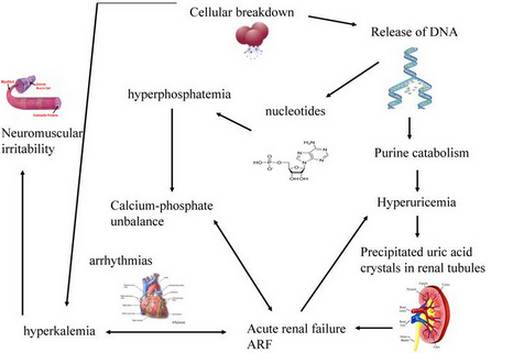Tumor Lysis Syndrome
What is Tumor Lysis Syndrome?
Tumor lysis syndrome is a serious metabolic crisis often linked among particular forms of tumors. Dilutions of electrolytes inside the cell, vary from electrolytes outside the cell. In tumor lysis syndrome, tumor cells break apart, liberating their insides into the blood vessel. It will lead to a hazardous modification in the usual equilibrium of fluid and electrolytes—the amounts of potassium, phosphate and uric acid are increased, whereas calcium levels are reduced. The alterations happen in a very rapid manner and may possibly be so fast that instant fatality can occur.
Symptoms & Signs
Initially patients are asymptomatic or they do not manifest any symptoms, however, as the syndrome progresses it will lead into the following symptoms:

Picture of Tumor lysis syndrome pathophysiology and symptoms
- Heartbeat irregularities
- Damage to mental ability
- Loss of awareness
- Difficulty of breathing
- Elevated blood potassium and uric acid levels shown in the laboratory tests
- Decreased blood calcium levels also shown in the laboratory tests
Treatment
Treatment is intended at preventive and palliative care, with the primary objectives to avoid kidney impairment and serious electrolyte problems. Patients who are vulnerable obtain treatment on a hospital to permit critical monitoring by hospital staff. The patients must have access to a dependable intravenous line always. Before starting treatment, a patient’s fluid levels and electrolyte status are cautiously calculated and examined. If the results came out and there are irregularities, the doctors may consider holding the treatment for a while, although this is not all the time a choice.
Laboratory examinations are completed regularly to check serum calcium, potassium, phosphate, magnesium and uric acid levels. A normal hospital procedure may need blood be removed for these examinations every two to six hours throughout two to three days. Subsequent are preventions and treatment plans for every major electrolyte problems like hyperuricemia, hyperkalemia, hyperphosphatemia, and hypocalcemia.
Hyperuricemia
Hyperuricemia is defined as an irregular elevation of serum uric acid levels that may possibly result to acute renal failure. There are a number of ways available to avoid renal impairment lie forceful hydration for instance. Also, drugs labeled as diuretics, for example furosemide or acetazolamide, are prescribed to aid increase urine excretion when needed.
Prophylactic allopurinol can also be prescribed to patients vulnerable for tumor lysis syndrome. One dose of 600 mg can be prescribed the day prior to treatment, followed by 300 mg once daily for the rest of treatment. Allopurinol is helpful since it stops the uric acid formation.
Hyperkalemia
Hyperkalemia is defined as an irregular elevation of serum potassium levels that may possibly result to hazardous irregularities in heart beats, heart attack, and muscle weakness. Regular checking with electrocardiography is suggested in patients vulnerable for tumor lysis syndrome in order that changes in the electrical movement of the heart can be detected ahead of time. Foods rich in potassium can also be limited to avoid by now high levels from elevating. Every now and then, drugs like Kayexalate are prescribed to facilitate reduction of serum potassium levels.
Hyperphosphatemia
Hyperphosphatemia is defined as an irregular elevation of serum phosphate levels that may possibly result to neuromuscular irritation and deteriorate kidney function. Cancer cells can have up to four times as much phosphate as non-malignant cells. Patients having acute tumor lysis syndrome can be taught to lessen their food intake of phosphate. Additionally, they can be prescribed drugs that attach to phosphate, thus preventing its intestinal absorption.
Hypocalcemia
Hypocalcemia is defined as an irregular reduction in serum calcium levels that may possibly result to tetany, muscle cramps, and seizures. A calcium supplement can be prescribed.
Dialysis
Dialysis is a process utilized to control electrolyte problems by means of diffusion and ultrafiltration of fluid. Hemodialysis is a process that eliminates waste products via the human’s blood. Dialysis can otherwise be executed via the peritoneum called peritoneal dialysis. Since peritoneal dialysis does not clean up phosphate and urate as proficiently, and since it is not possible in patients with abdominal growths, hemodialysis is the ideal process. A physician who focuses in nephrology will normally inspect a vulnerable patient prior to cancer management, to get ready for the option of dialysis. In several cases, dialysis begins as a precautionary measure, both prior to or throughout cancer treatment.